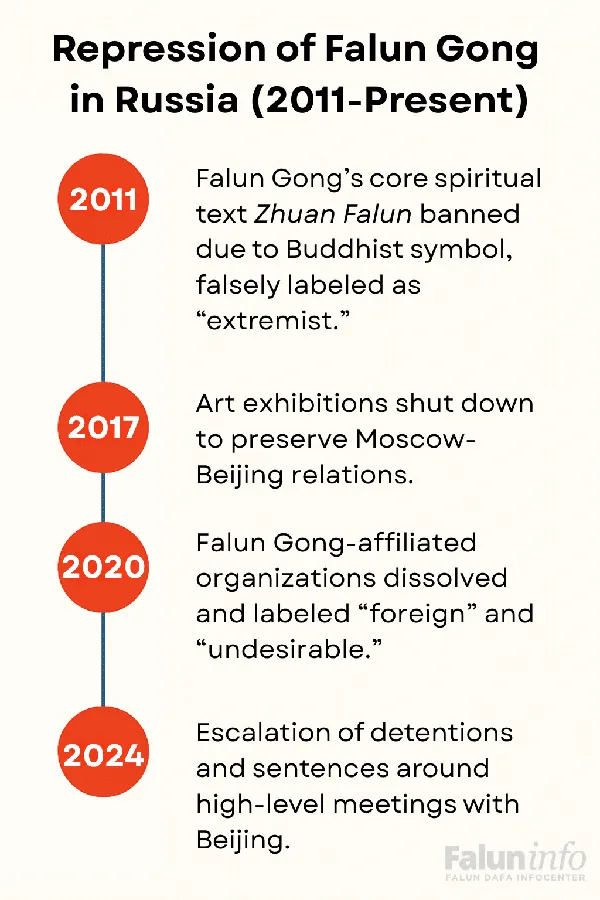
The inhumane practice of organ harvesting, to which Falun Gong members imprisoned in China are subjected, was the subject of the documentary film “Free China: The Courage to Believe,” which helped break down the wall of silence and ignorance on the subject. But Beijing government's constant efforts to export its negative propaganda against Falun Gong continue to cause damage in Russia —and elsewhere— as the following article tells us. In these times when we are daily flooded with bad news and gruesome images (Ukraine, Gaza, etc.), habituation to evil seems to have become the antidote “to get by.” However, the real antidote is awareness of what is happening and the constant struggle to defend our rights, including the right to freedom of belief.
Russia Jails Falun Gong Practitioners, Escalating Beijing-Backed Persecution Abroad
Authorities invoke ‘foreign organization’ and ‘undesirable’ laws to prosecute meditators

Natalia Minenkova meditating in a park in Russia, July 2022.
WASHINGTON DC — In a serious escalation in the repression beyond China’s borders, a Moscow court yesterday sentenced Falun Gong volunteer Natalia Minenkova to four years in prison—the harshest sentence yet for a practitioner in Russia. Her sentencing follows that of Zhu Yun, who received three years in June, and Oksana Shchetkina, sentenced to two years last November. The increasing severity of these punishments comes just one day after another hearing in Krasnodar involving two more Falun Gong adherents.
In total, eight practitioners have been detained across Russia since March 2024—signaling a troubling sign of how the Chinese Communist Party’s (CCP) campaign against religion is being exported abroad. The U.S. State Department and the U.S. Commission on International Religious Freedom (USCIRF) condemned the prosecutions, calling on Russia to respect religious freedom and stop targeting minority faiths such as Falun Gong.
“The United States condemns the Russian government’s actions targeting and repressing members of religious minorities, including Falun Gong practitioners. We urge Russia to respect the right of all to exercise the freedom of religion or belief. All religious minorities should be able to enjoy freedom of religion and assembly without interference.” — U.S. State Department spokesperson
The sentencing of Minenkova and others are “yet another example of [Russia’s] expansive, completely baseless crackdown on individuals who ostensibly don’t align with Russia’s domestic or foreign policy objectives,” according to USCIRF vice chair Asif Mahmood. The United States should “use its powerful voice to highlight the repression of religious groups in Russia, including Falun Gong practitioners.”
The Moscow Falun Dafa Association had operated legally for years, including under regular inspection by the Ministry of Justice without issue. Since 2020, however, Russian authorities have begun issuing criminal charges against Falun Gong practitioners under Article 284.1 of the Criminal Code, citing alleged association with “undesirable” foreign organizations. In total, seven Falun Dafa-related or international human rights organizations have been designated as illegal by the Russian government since 2020, forming the legal basis for criminal charges.
“This is dangerous and deeply concerning. Russia is now criminalizing meditation under laws widely seen as politically motivated and legally unfounded,” said Levi Browde, Executive Director of the Falun Dafa Information Center. “It is beneath Russia’s sovereignty and national dignity to bow to pressure from Beijing to ban Falun Gong and imprison its own citizens. History will not look kindly on those who choose to collaborate with the Chinese Communist Party—the most brutal communist regime in the world today.”
Latest developments in Russia
On July 23, 2025, a Moscow court held a hearing for Natalia Minenkova, who has been held in pre-trial detention since May 3, 2024, for alleged affiliation with banned Falun Dafa organizations. This marks the latest in a series of hearings, with the court now handing down a four-year prison sentence—the longest to date. Minenkova is one of eight Falun Gong practitioners currently facing or serving sentences under Article 284.1 of the Russian Criminal Code, which prohibits activities linked to so-called “undesirable” foreign organizations.
Others include Oksana Shchetkina, sentenced to two years in prison in November 2024 and Zhu Yun, who received a three-year sentence in June 2025. Several others—including Mikhail Sinitsyn, Mikhail Antonenko, Gennady Buslov, Ildar Maksinyaev, and Denis Shibankov—have been detained or received non-custodial sentences over the past year.
All of the cases are founded on a questionable legal basis (see details below). The Falun Dafa Information Center has delayed releasing updates about them for privacy, security, and legal considerations.
Legal inconsistencies in charges
The criminal cases stem from a July 2020 decision by Russia’s General Prosecutor’s Office, which declared seven international organizations as “undesirable,” providing the legal pretext for prosecution. The organizations range from Falun Gong-founded ones, such as the European Falun Dafa Association or the World Organization to Investigate the Persecution of Falun Gong, to international supporters and human rights groups, like Friends of Falun Gong and Doctors Against Forced Organ Harvesting.
Despite the serious charges, the legal basis for Russia’s prosecution of Falun Gong practitioners shows inconsistencies and procedural gaps. These loopholes raise serious doubts about the legitimacy of the cases.
Natalia Minenkova, before her trial, highlighted several inconsistencies in her case through contacts who relayed her comments to the Falun Dafa Information Center:
“At first, I was accused of being associated with seven organizations. In the end, only two were left. One of them ceased to exist back in 2017. All requests to the Ministry of Justice about why they were included in the list of undesirable organizations remained unanswered. There is no [record of] correspondence or calls with members of these organizations in my file. Besides, I don’t know English.”
The Moscow Falun Dafa Association, which Minenkova was affiliated with, had operated legally for years, including regular inspections by the Ministry of Justice without issue. According to Minenkova, the association’s activities centered on meditation and personal well-being—non-political practices—and complied with Russian law. She also organized weekly meditation sessions in local parks, which were peaceful, voluntary, and did not disturb public order or infringe on the rights of others.

Minenkova meditating in a park in Russia, July 2022.
Such activities are protected under Article 28 of the Russian Constitution, which guarantees freedom of conscience and religion, including the right to profess any religion individually or jointly with others, and to conduct religious practices. Moreover, the European Convention on Human Rights (Article 9)—to which Russia was a party until 2022—as well as the International Convention on Civil and Political Rights—to which Russia remains a party—similarly protect the right to freedom of thought, conscience, and religion. Even under Russian domestic legal frameworks, peaceful spiritual assembly and non-political association fall outside the scope of Article 284.1, which is intended to target genuinely harmful foreign interference.
The lack of evidence linking Minenkova or the association to harmful or unlawful conduct raises serious concerns about the legitimacy of the charges. Her case reflects a broader risk of misapplying anti-extremism and foreign agent laws in ways that undermine constitutionally protected religious freedom.

Prior to the latest escalation, Russia’s suppression of Falun Gong unfolded in waves: in 2011, Falun Gong’s core spiritual text Zhuan Falun was banned as “extremist,” due to its use of the Buddhist swastika (a symbol widely used in Asian religions and art), marking one of the earliest formal acts of repression. In 2017, art exhibitions depicting persecution in China were shut down, reportedly to preserve diplomatic relations. In 2020, regional associations were dissolved and texts such as Nine Commentaries on the Communist Party were banned.
These developments trace a clear arc from censorship and pressure on civil society to systemic criminalization of peaceful spiritual practice.
Broader pattern across borders
The repression of Falun Gong is not limited to Russia. In Serbia, police detained eight individuals—including filmmaker Dejan Marković—ahead of Xi Jinping’s May 2024 state visit, with no charges filed and releases occurring shortly after Xi’s departure. In Malaysia, 76 practitioners were detained just two days before Xi’s April 2025 visit—the largest such action in the country’s history.
“A troubling pattern is emerging between CCP influence and the repression of Falun Gong,” said Browde. “These incidents raise serious concerns that Moscow and other governments may be suppressing peaceful religious groups to align themselves more closely with Beijing—using repression as a form of diplomatic currency.”
Policy recommendations
While the Russian Constitution guarantees freedom of conscience, these developments signal a growing willingness of governments to compromise civil liberties under foreign pressure.
“Russia seems to be taking extreme measures to curry favor with Beijing,” said Browde. “Moscow has officially listed seven Falun Gong–related organizations as illegal, and authorities are now issuing criminal sentences for meditation—far beyond the temporary detentions seen in Serbia and Malaysia. We urge democratic governments and international bodies to act now to stop this domino effect of worsening treatment and religious persecution exported from Beijing.”
For U.S. Policymakers:
- Publicly condemn Russia’s prosecution of Falun Gong practitioners and call for the immediate release of those imprisoned for peaceful religious practice.
- Raise the issue of transnational repression in bilateral and multilateral forums, especially where Russia and China collaborate.
- Re-designate Russia as a country of particular concern, citing this case.
For EU Policymakers:
- Coordinate with allies to counter growing CCP-linked religious persecution beyond China’s borders.
About Falun Gong
Falun Gong, also known as Falun Dafa, is a peaceful spiritual practice rooted in Buddhism. Adherents follow the principles of truthfulness, compassion, and tolerance. Falun Gong is freely practiced in over 110 countries. In China, the CCP has waged a brutal campaign to eradicate Falun Gong since 1999, involving mass arbitrary detention, torture, and forced organ harvesting. The regime has also increasingly sought to extend its persecution beyond China’s borders through physical threats, censorship, and other forms of transnational repression.
Media contact: Levi Browde at levib faluninfo.net (levib[at]faluninfo[dot]net).
faluninfo.net (levib[at]faluninfo[dot]net).
Source: falunInfo





